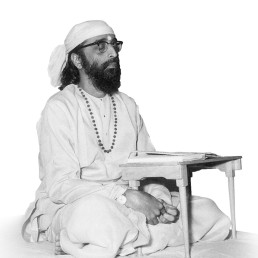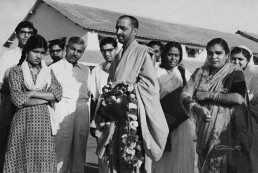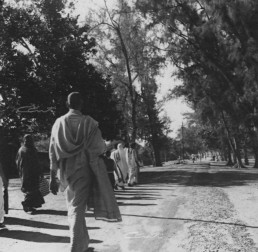
Jnana Yajna 27

Year & Dates:
February 17, 1957 to March 03, 1957

Yajna Topic:
Bhagavad Gita - Chapter 16 & 17

Place:
Kolkata, India.
Devotees who gathered at the Howrah station in Kolkata (previously Calcutta) to receive Pujya Gurudev Swami Chinmayananda were in for a surprise. The familiar “bearded, Chinmaya” emerged with a smiling, clean-shaven face, wearing no shirt but only the angavastra (draping cloth) and saffron dhoti. In respectful honor of Parama Guru Swami Tapovanam’s Mahasamadhi, Pujya Gurudev had taken the vow to be shirtless for a year. His personal austerity and Guru-Bhakti added a special glow to the spirited sage. Pujya Gurudev was, for the first time, bringing out the knowledge in Chapters 16 & 17 of Shrimad Bhagavad Gita. This notable privilege delighted the large crowds of Kolkata in the 27th Jnana Yajna.
Faith, Pure and Powerful
When Justice Ram Prosad Mukherjee unveiled the portrait of Arjuna’s despair and Bhagavan Krishna’s Celestial Song in the brimming hall of Maharashtra Niwas, it signaled a strong start to another enriching Gita Jnana Yajna. “Power is true only when supplemented by inner strength,” stressed Sri Kalidas Nag, an Indian historian and parliamentarian, in his inaugural address. With words of great power, Pujya Gurudev reminded the audience that Bhagavad Gita, the “small hand-book of instructions,” could supplement a busy marketplace with valuable virtues. He reiterated how virtues were prerequisites for entering the portals of Vedanta and that Gita did not rush to condemn the morally-fallen or commend the virtuous. The 16th chapter scientifically presented the ways an embodied self behaves in the physical, mental, and intellectual planes of experiences – disciplined or indisciplined. Then, Pujya Gurudev asserted the importance of faith in all aspects of human efforts as elucidated by Bhagavan Krishna in the 17th chapter. Pure and noble intentions fueled by deep faith can transform any venture into a spiritual victory – so taught Pujya Gurudev as His Gita Jnana Yajnas stood testimony to His unflinching faith in the Highest.
Photo Gallery

“Think,” Says Pujya Gurudev
To a seeker, living the ethical values, is in itself, a kind of treatment to cure him of some of his personality-diseases. To the Hindus, a sinner is not a dangerous mental leper or a failure of the omnipotent Lord. To a Vedantin, satan is not a perpetual challenge to God. The good, contaminated by weakness and ignorance, is the evil. And the evil, when cured of ignorance, itself becomes the good.”
From Bhagavad Gita- Chapters 16 & 17, Book
Shraddha determines the texture of our impressions in us, which in turn commands our view of life. Our desires, thoughts, and actions are charted by our view of life. Naturally, an individual’s physical activities, psychological behaviors, and intellectual makeup are all ordered by the type of Sraddha he has come to maintain in himself…As his inner disposition, so the man.
From Bhagavad Gita- Chapters 16 & 17, Book
If you have these, you are Wealthy!
In this enlightening excerpt inspired by the teachings of the Bhagavad Gita, delve into the essence of inner wealth and its significance in shaping one’s character and achievements. Explore the six essential qualities—Teja (Vigour), Kshama (Forgiveness), Dhriti (Consistency), Shaucham (Cleanliness), Adroha (Non-Cruelty), and Na-Atimanita (Humility)—that constitute the foundation of inner wealth. Discover how nurturing these qualities empowers individuals to overcome challenges, maintain resilience, and ultimately achieve success, both inwardly and outwardly.



